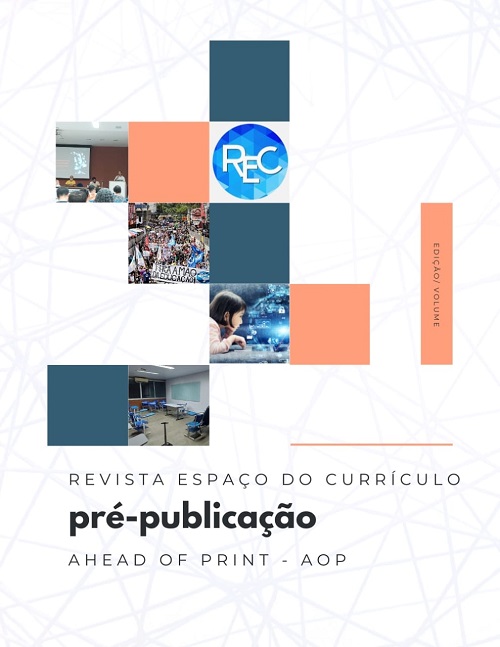EDUCATION, EVALUATION AND PERFORMATIVITY
effects on curricula, everyday and teacher subjectivity
Keywords:
Assessment policy; performativity; inventive resumes; school routines.Abstract
The article starts from the perspective that schools are spaces for the outpouring of knowledge, meanings and affections that intend hegemony in the production of evaluation policies that exclude the curricula produced by thinking practitioners in everyday life in/from schools; they try to nullify their life context, using evaluative indicators to achieve goals and performance to validate teaching practice. It shares how the normative influence, between the National Common Curricular Base (BNCC, 2017) and evaluation policies, permeates teaching, curricula and daily life at/in the school. More specifically, it argues about attempts to centralize and unify curricula and teaching practice. I highlight the inventive force of creation and curricular experiences that permeates the school, where there is life and production beyond what is considered competence and ability, by evaluation policies. Managerialism and performativity are the main technologies discussed in research involving the themes: evaluation policy, large-scale evaluations, teacher training, curricula, daily life and education and, with these aspects together with the theoretical-methodological contribution of Ball (2012) , Macedo (2014), Alves (2012), Carvalho (2013) and Foucault (1977) we aim to shift thoughts and compose other possibilities for study and research, as only the strength of the collective can destabilize attempts at rigidity in the school space.
Downloads
References
BALL, Stephen J. Diretrizes políticas globais e relações políticas locais em educação. In: Currículo sem fronteiras, v.1, n.2, pp.99-116, Jul/Dez 2001.
BALL, Stephen J. Reformar escolas/reformar professores e os terrores da performatividade. In: Revista Portuguesa de Educação, p. 03-23, 2002.
BALL, Stephen J. Profissionalismo, gerencialismo e performatividade. Cadernos de Pesquisa, Trad. C. R. Duarte; M. L. M. Gomes; V.L.M. Visockis, v. 35, n. 126, p. 539-564, set./dez. 2005.
BALL, Stephen J; MAINARDES, Jefferson. (Orgs.). Políticas educacionais: questões e dilemas. São Paulo: Cortez, 2011.
BAUER, Adriana; GATTI, Bernadete (Org.). Vinte e cinco anos de avaliação de sistemas educacionais no Brasil: implicações nas redes de ensino, no currículo e na formação de professores. Florianópolis: Insular, 2013.
BERNSTEIN, B. (1996). Pedagogy Symbolic Control and Identity. London: Taylor and Francis
BRASIL. Constituição da República Federativa do Brasil de 1988. Diário Oficial [da] República Federativa do Brasil, Brasília, DF, 5 out. 1988.
BRASIL. Portaria ministerial nº 931, de 21 de março de 2005. Institui o Sistema de Avaliação da Educação Básica – SAEB, que será composto por dois processos de avaliação: a Avaliação Nacional da Educação Básica – ANEB, e a Avaliação Nacional do Rendimento Escolar – ANRESC. Diário Oficial da União, Brasília, DF, 22 mar. 2005. Seção 1, p. 17.
BRASIL. Portaria INEP nº 47, de 3 de maio de 2007. Estabelece a sistemática para a realização da Prova Brasil e da Avaliação Nacional da Educação Básica no ano de 2007. Diário Oficial [da] República Federativa do Brasil, Brasília, DF, 7 maio 2007.
BRASIL; Sistema de Avaliação da Educação Básica (Saeb). Portaria n.º 931, de 21 de março de 2005. Disponível em: http://portal.inep.gov.br/web/guest/saeb Acessado em 29 de janeiro de 2024 às 03:50.
DILLABOUGH, J.-A. Gender politics and conceptions of the modern teacher: women, identityand professionalism. British Journal of Sociology of Education, v. 20, n.3, p.373-394, 1999.
DELEUZE, Gilles & GUATTARI, Félix. Mil Platôs: capitalismo e esquizofrenia. Trad. Aurélio Guerra Neto e Célia Pinto Costa. Rio de Janeiro: Ed. 34, 2000
FERRAÇO, Carlos Eduardo; CARVALHO, Janete Magalhães Carvalho (Org.). Currículos, pesquisas, conhecimentos e produções de subjetividades. - Petrópolis, RJ : DP et Alii ; Vitória, ES: Nupec/Ufes, 2013.
FOUCAULT, Michel. O poder simbólico. In: ______. Vigiar e punir: nascimento da prisão. Trad. Raquel Ramalhete. 16. ed. Petrópolis: Vozes,1997. p. 22.
FOUCAULT, M. (1979b). On Governmentality. Ideology and Consciousness, 6(1), pp. 5- 22.
CARVALHO, J. M. (2018). REDES DE CONVERSAÇÕES COMO UM MODO SINGULAR DE REALIZAÇÃO DA FORMAÇÃO CONTÍNUA DE PROFESSORES NO COTIDIANO ESCOLAR. Revista De Ciências Humanas, 2(2). Recuperado de https://periodicos.ufv.br/RCH/article/view/3572
LYOTARD, J.-F. The Postmodern condition: a report on knowledge,10. Manchester: ManchesterUniversity Press, 1984.
MACEDO, E. F. (2019). Fazendo a Base virar realidade: competências e o germe da comparação. Retratos Da Escola, 13(25), 39–58.
MAUSETHAGEN, Solvi. Governance through concepts: The OECD and the construction of competence in Norwegian education policy. Berkeley Reveiew of Education, v.4, n.1, p.161-181,2013.
MCNESS, E., P. Broadfoot and M. Osborn: is the effective compromising the affective? BritishEducational Research Journal, v.29, n.2, p.243-257, 2003.
OLIVEIRA, Inês Barbosa de T. Currículos e pesquisas com os cotidianos escolares: afirmando a complexidade e a diferença ns redes de conhecimento dos sujeitos praticantes. In: Ferraço, C. E.; Carvalho, J. Currículo, pesquisas, conhecimentos e produções de subjetividade. Petrópolis, RJ: DP et Aliii, Vitória, ES: Nupec/UFES, 2013.
SAHLBERG, P. Finnish Lessons 2.0. Nova york: Teachers College Press, 2015.
SELLAR, Sam & LINGARD, Bob. The OECD and global governance in education, Journal of Educacion Policy, v.28. n.5, p.710-725, 2013. DOI: https://doi.org./10.1080/02680939.2013.779791.
SOUSA, Clarilza Prado de. Dimensões Da Avaliação Educacional. Estudos em Avaliação Educacional, n. 22, 101-118, 2000.
Downloads
Published
How to Cite
Issue
Section
License
Copyright (c) 2024 Curriculum Space Journal

This work is licensed under a Creative Commons Attribution 4.0 International License.
By submitting an article to Curriculum Space Journal (CSJ) and having it approved, the authors agree to assign, without remuneration, the following rights to Curriculum Space Journal: first publication rights and permission for CSJ to redistribute this article. article and its metadata to the indexing and reference services that its editors deem appropriate.












